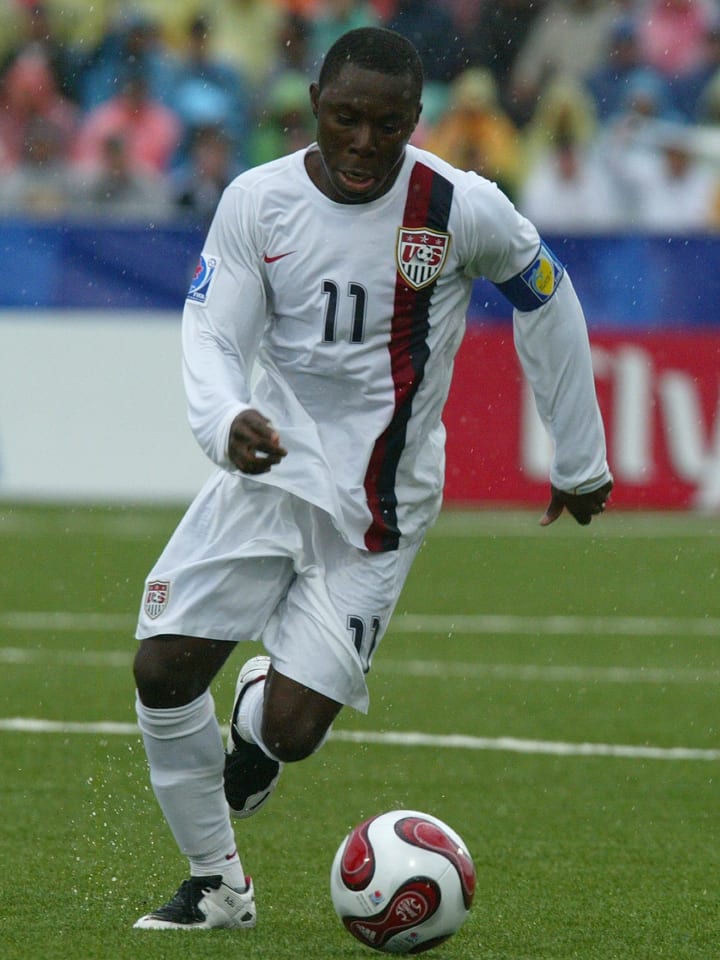
What happened to Freddy Adu, football’s original wonderkid?
Most 14-year olds daydream about the goal of the weekend in science class. Most 14-year olds have, at one point or another, at least thought about breaking an XBOX or PlayStation controller in a FIFA-induced fit of rage. Most 14-year olds do not start their professional football debuts and, in doing so, become a true global sensation.
But Freddy Adu, at 14, wasn’t like the rest.
The American is arguably the most famous case of ‚overhyped wonderkid‘ the footballing world has ever seen and, with his evident abundance of pure talent on show during his early teens, it’s no surprise there was so much excitement around the youngster.
ON THIS DAY: In 2003, Freddy Adu signed his first professional contract with DC United at the age of 14. pic.twitter.com/nfHCGrYbyh
— Squawka Football (@Squawka) November 18, 2015
From the highest heights, however, you fall the furthest. And in Adu’s case, he plummeted into the abyss and almost completely out of memory.
But there will always be a place in footballing history for him. Let’s take a look back and remember the tragic career of, and lessons learned from, the original modern-day wonderkid. What ever happened to Freddy Adu?
Adu was eight years of age when his family moved to the United States from Ghana, where he had played football with men more then three times his age – and dominated them, by the way.
Six years after he arrived in the USA, Adu had been snapped up by MLS and drafted into the DC United side for the 2004 season, becoming the youngest ever athlete to play a professional sport in the country.

As you can imagine, the hype around the teenager was extraordinary and led to multiple brand deals. Nike signed with Adu on a £1m contract, while companies were flocking to get him in their adverts to raise the world’s awareness of America’s new prodigal son.
One of these adverts stood out from the rest and gave Adu a tag he simply could never live up to. Soft drink company Pepsi got the 14-year old to pit up against Brazilian legend Pele in some friendly competitive action to advertise Sierra Mist and, inevitably gave the teenager the unenviable label of „the next Pele“.
Everything pointed to a successful career in the early stages, however. Even before he turned professional with DC United, Adu had led the USA Olympic Development squad to an Under-14 tournament win against European opposition, leading the scoring charts throughout and being named the competition’s MVP. And the good times continued in the MLS.
In his first senior season, still aged 14, he became the youngest scorer in MLS history and no one has come anywhere near breaking the record since. Adu went on to make 30 appearances for DC United in 2004, notching five goals and making four assists which, for a 14 to 15 year old, is not bad. Not bad at all.
Happy Birthday, Freddy Adu! ?
The youngest ever MLS scorer… ??pic.twitter.com/R5tsASbPZl
— Goal (@goal) June 2, 2019
His head-turning performances were enough to grab the attention of Sir Alex Ferguson and, in 2004, the teenager was given a two-week trial with Manchester United’s academy. However, failing to obtain a work-permit, Adu was unable to play any competitive fixtures while in England and was sent back to the States.
While still performing well for his age, the teenager’s numbers gradually decreased over the next couple of seasons. In 2005, Adu managed seven goal contributions and, in 2006, just six. Despite him getting into the USA national team and making his debut in January 2006, DC United coaches began to lose faith in Adu, because of his lack of progression and development,. The midfielder eventually made the switch to Real Salt Lake in 2007.

Two goals and an assist in 11 games over the course of the first half of the 2007 MLS campaign and a good showing as USA captain at the 2007 Under-20 World Cup brought his first spell in America to an end. Benfica, fuelled by sensational media hype more then thorough scouting, brought the 18-year old to Portugal for $2m and inadvertently sent Adu’s career spiralling.
Despite scoring a respectable four goals in 17 matches for Benfica, Adu was sent out on loan and failed to impress at Monaco, Belenenses, Aris Thessaloniki and Caykur Rizespor over the next three seasons – although still remained in the national side, getting two goals in 17 caps until 2011. He was then shipped back to the MLS to enjoy a decent spell with Philadelphia Union.
Ten goals and three assists in his 41 Union matches from 2011 to 2013 weren’t enough to reignite his career, however, and the 22-year old was let go. Adu joined Brazilian side Bahia in March 2013, where he lasted just four games before having to find another club. The American started embarking on trial periods around Europe – including Blackpool and AZ Alkmaar – but could only secure a contract with Serbian outfit FK Jagodina in 2014.
After just one appearance for Jagodina, the American international went onto endure failed spells at Kuopion Palloseura of Finland, Tampa Bay Rowdies and Las Vegas Lights – both of the USA second tier.
With a professional career seeming all but possible, Adu left Las Vegas Lights at the end of 2018 and began working as a football youth coach in Maryalnd. A two-year hiatus from the game was momentarily halted in October 2020 when he joined Osterlen FF of the Swedish third tier but, in February, the club deemed him too mentally and physically unfit to play.

The story of Freddy Adu is a tragic one. He was nothing more than a boy with supreme footballing talent, thrown into the world’s view with minimal preparation. His Hollywood-style introduction into professional senior environments in his early teens rather than letting him progress at his own pace was probably a factor in his stifled development, and severe media pressure certainly was.
Might we have seen a new Pele without the globe’s eyes on a 14-year old Adu? Probably not. But could the USA have had a true superstar? Maybe.